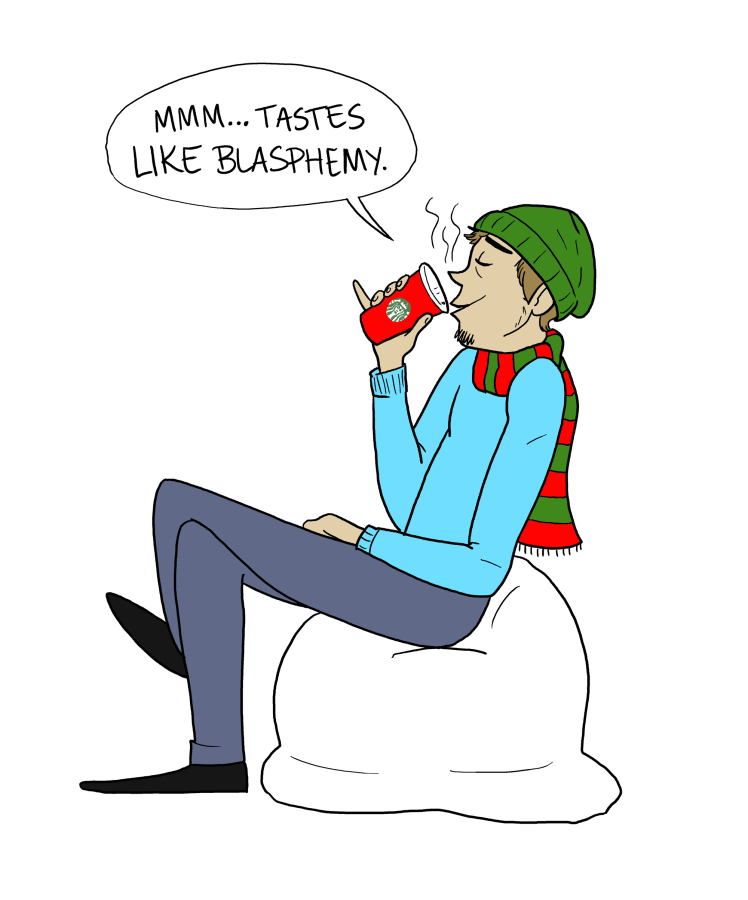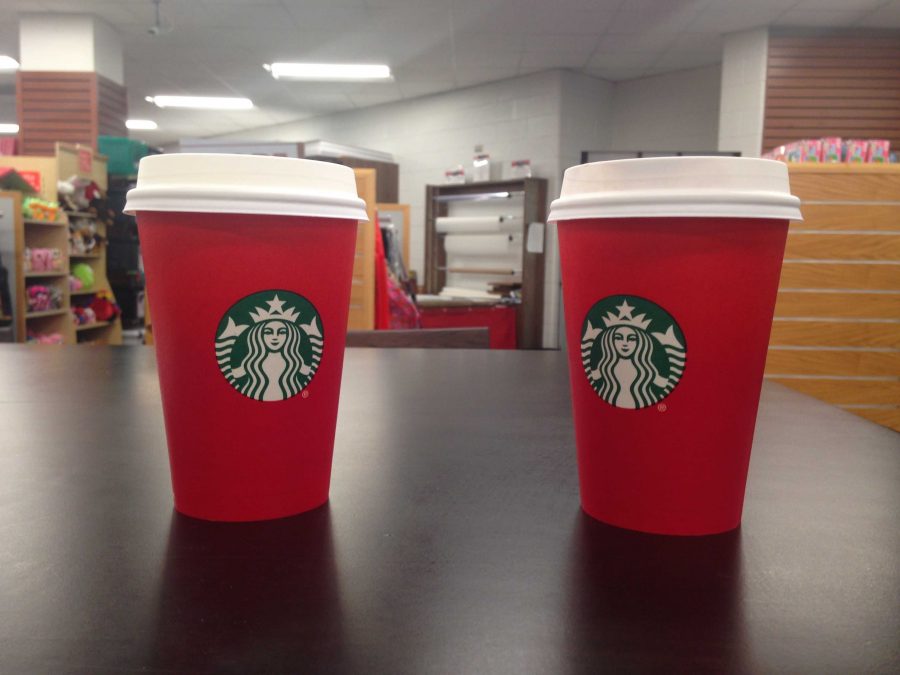Starbucks Should Have Celebrated Festive Cheer with Decorated Cup
by Elyse Jost
If you haven’t heard, Starbucks is canceling Christmas this year. The coffee company recently released their annual red “holiday cups,” but to many consumers’ dismay, the cup features a red-maroon ombré effect and fails to express anything about the holidays, cozy weather or snowfall — basically anything distinguishing the winter months as a season of cheer.
There is a pretty big debate going on over whether the cups should have pictures depicting sentiments of holiday spirit. To have a solely red cup seems offensive to some, especially those who have been waiting for the festive drinks.
Personally, I’m fine with the cups either way. To be making such a large issue over it obviously means the public is more concerned with the image of themselves and their corporatized holidays than real problems in today’s world. That said, I stand by the opinion that Starbucks, especially after seeing how their consumers have responded, should have decorated the cups.
I promise I’m not just buying into the whole idea to sell out — but I do think that adding that little extra message can put people in a “holiday-esque” spirit marked, if only subtly, by joy and charity. Small, subliminal prompts towards seasonal cheer — like those once found on Starbucks’ holiday cups — can add up over time and encourage people to give to the poor or homeless, volunteer and focus more on giving than receiving. If we’re all going to be staring at the trendy cups anyway, why not be feeling the love?
In terms of how Starbucks should decorate the cups, I believe we need to see a more balanced representation of the happiness that can spread during these late winter months. Rather than specifically writing “Merry Christmas,” why not continue with their incorporation of anonymous talent providing works of art for the well-known cups? Starbucks should put out a contest for artwork by people of all ages for the new design. The parameters should include drawings that represent each December holiday (Christmas, Kwanzaa, Hanukkah, etc.), as well as a message to have a happy winter or any other joyful expression they may find fitting.
Many debates can be held over the political “correctness” of the celebratory clauses indicating religious holidays. Some people are offended when they don’t hear “Merry Christmas!” as they check out at the grocery store, while others find it disagreeable when people make assumptions about their religious affiliations and which holiday they celebrate (or don’t).
I think that by adding all possible inclusions of merry spirits, rather than eliminating all traces of potential joy-spreading, Starbucks can help ease the pain some have felt by this change in business plan, while helping everyone to be a little more caring this winter.
Starbucks’ Cup Design Reflects a Progressive, Multicultural Policy
by Emma Tanner
An enormous amount of coverage and attention has been aimed at the Starbucks “Red Cup Controversy” this past week — more so than a topic of this caliber warrants. I’m all about questioning motives and decisions on both the individual and corporate levels, but this is an example of an issue that has been taken to an unnecessary extreme. It’s been taken so far, in fact, that presidential candidates are commenting on the matter with complete seriousness. It’s astounding and, quite frankly, embarrassing, especially when Starbucks is entirely in the right in their decision to abandon their traditional holiday cup graphics, which have included images tied to Christmas like ornaments and reindeer, for a new, clean and multiculturally-applicable solid red cup. While this topic doesn’t warrant such high-profile attention, Starbucks doesn’t deserve intense ridicule and skepticism this holiday season by those who see a “war on Christmas” and Christianity everywhere.
The “War on Christmas” is the product of overly intense, traditional right-winged Christian conservatives accusing a progressive society of abandoning the values and traditions of this country. According to U.S. News and various other sources, Donald Trump has even taken the liberty of suggesting a boycott against Starbucks, going on to state that, “If I become president, we’re all going to be saying ‘Merry Christmas’ again. That I can tell you.” It’s shameful that an American presidential candidate could even see a strategy in appealing to such an unbelievably superficial controversy — that he could potentially earn votes by condemning Starbucks’ attempt to act as any smart, fair company would in a multicultural capitalist society. We’re better than that, people.
Starbucks is an international business, and, as a business first and foremost (not a church, not a symbol of specific cultural values), has the right to make the decisions that will lead to the most social appeal and generate as much revenue for the company as it can. If it wants to fulfill its role as a widespread, profit-maximizing company it has to acknowledge its responsibility to shareholders to appeal to and accommodate as many people as possible — not just traditional American Christians. Excluding any subset of customers based on religion or cultural heritage poses problems for any business looking to expand to the scale Starbucks has.
This entire controversy is childish to say the least. Starbucks isn’t trying to disband Christmas in America for those who celebrate it. It’s trying to be respectful of those customers and employees who don’t and accommodate them equally, along with Christians. To think otherwise is naïve and just another example of how ignorant, self-righteous and superficial our society has become. If this is what Christmas is all about to American celebrators these days, I’d rather not participate. Now, if you need me, I’ll be at my local Starbucks drinking a peppermint latte out of what I think is their most attractive cup yet.



